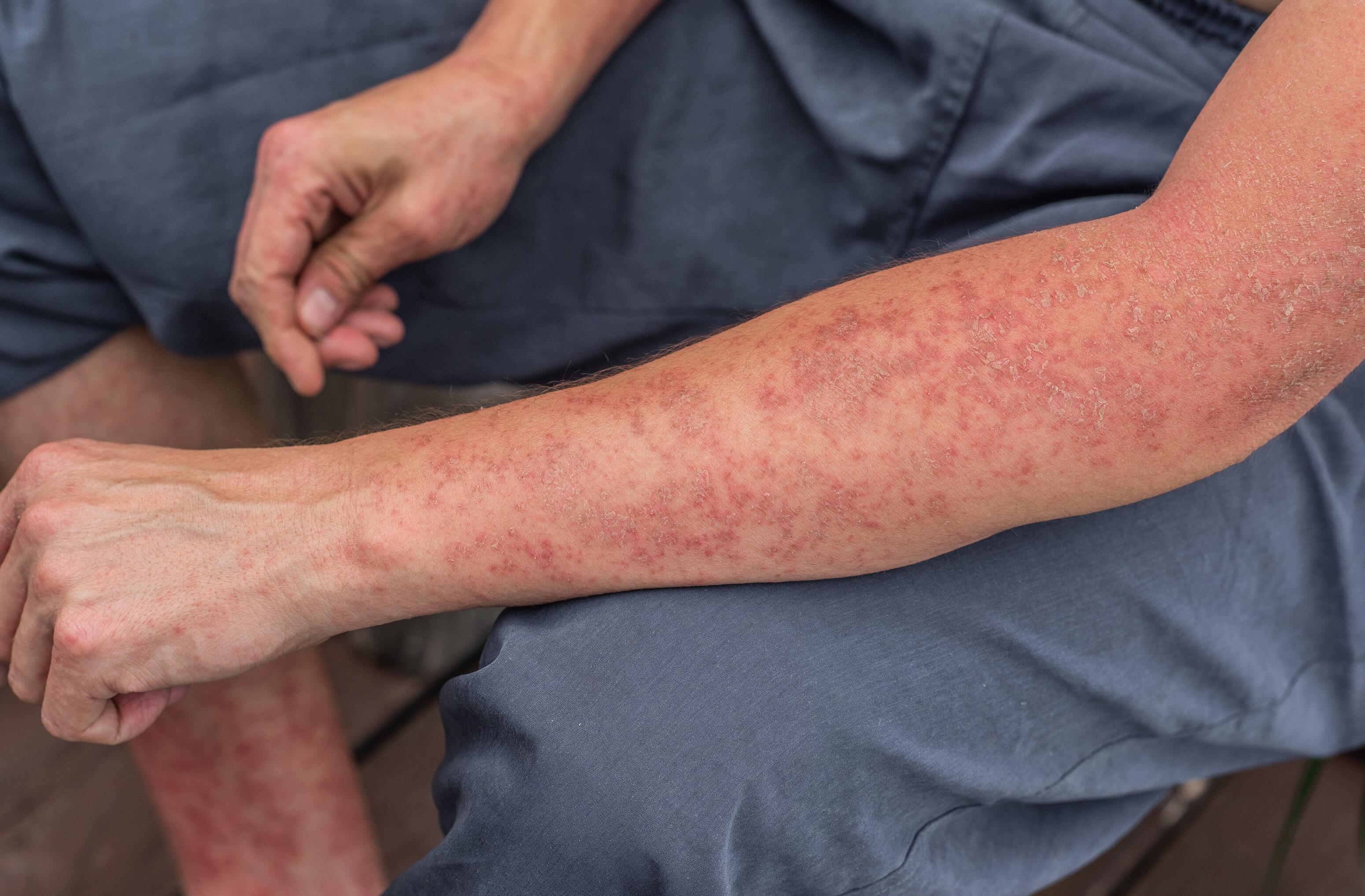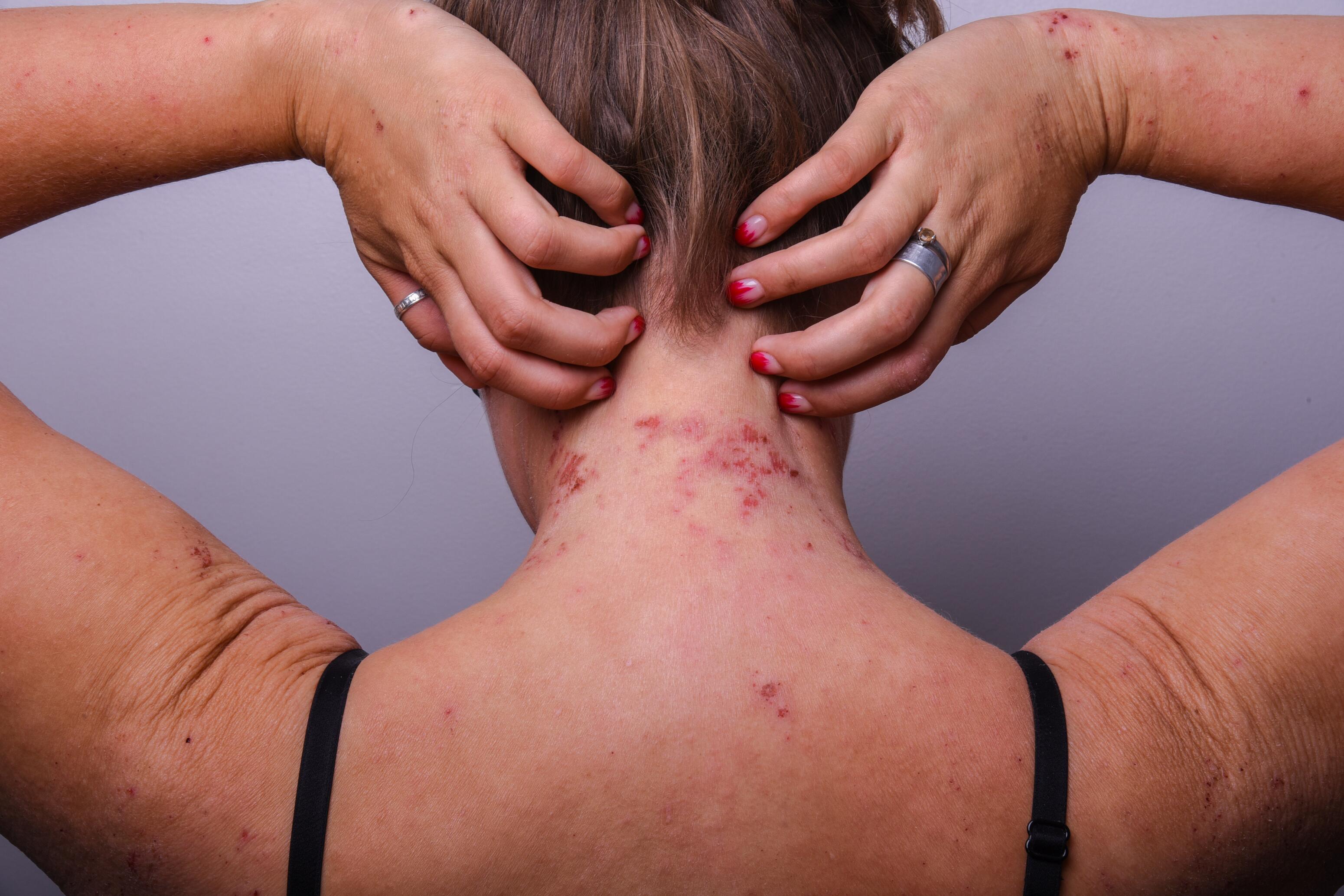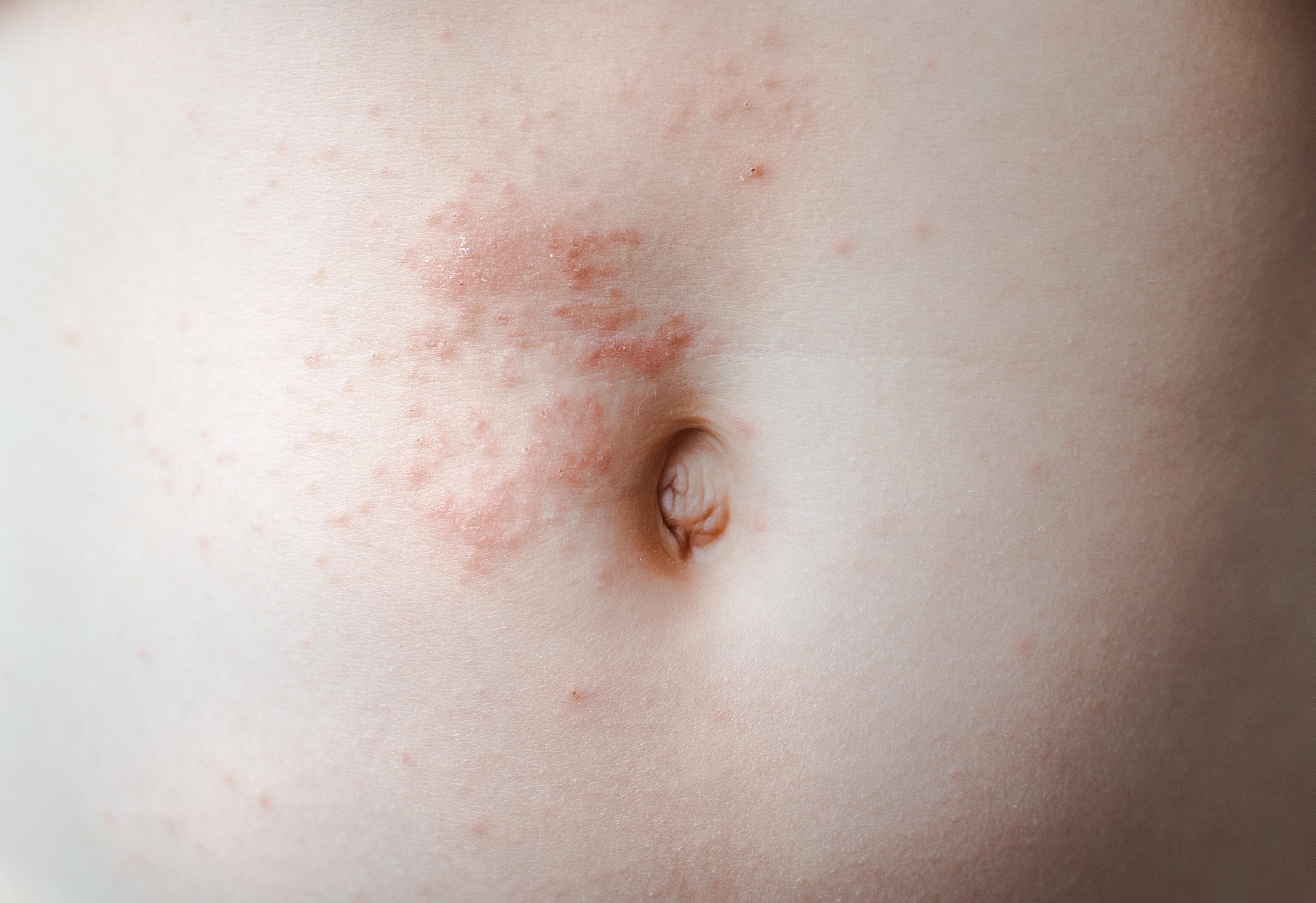Explore the truth behind eczema and contagiousness: causes, symptoms, treatments, and preventive measures. A guide to understanding and effectively managing eczema.

Summary
Eczema refers to a group of inflammatory skin conditions characterized by dry skin, itching, and typical lesions (red patches, blisters, oozing, scales, crusts).
In everyday language, the term "eczema" most often refers to atopic eczema, the most common type of eczema.

Atopic dermatitis, or atopic eczema, is characterised by successive phases of flare-ups and remissions of typical eczema symptoms. It is primarily a childhood disease that usually begins in the first months of life and disappears during growth. It often occurs in a family with a history of atopy and can be associated with other allergic diseases like asthma and allergic rhinitis.
Among other types of eczema, we find:
The symptoms of eczema are characterised by:
The diagnosis of eczema is clinical; the doctor collects the patient's medical history and examines the entire skin.
Patch tests can confirm the diagnosis of allergic contact dermatitis. Other tests (searches for specific IgE, skin biopsies, leg doppler ultrasound) are rarely indicated.
Eczema is a common skin condition surrounded by many misconceptions, especially regarding its contagiousness. Sorting out myth from reality is essential: no, eczema is not contagious.
Eczema is not an infectious disease but an inflammatory one. It does not spread through physical contact or by contaminated objects. Understanding the true nature of eczema is crucial to reducing the stigma and misunderstandings surrounding this condition.
However, eczema transmission can be hereditary. In cases of atopic dermatitis, parents can pass on genetic mutations responsible for the disease to their children.
The causes of eczema are multifactorial and complex.

This inflammatory disease can have genetic causes at the root of eczema's hereditary transmission. A mutation in the filaggrin gene, a protein essential for the integrity of the epidermis, is particularly common in atopic dermatitis. Without filaggrin, the skin's structure is altered; it retains water poorly, becoming dry and more permeable to environmental factors, irritants, or allergens. Dysfunctions in the immune system lead to an excessive allergic reaction to these substances, responsible for the skin symptoms of eczema.
Multiple environmental factors can trigger or worsen eczema:
- Airborne allergens (pollens, dust mites, animal fur) and pollutants.
- Climatic conditions (dry or overly moist environments).
- Inappropriate hygiene habits (too frequent or hot showers, irritating cosmetic products).
- Irritants (chemicals, soaps, perfumes, detergents, textiles)
- Food allergens (peanuts, shellfish, eggs), particularly in infant eczema.

While there is no direct transmission of eczema, some of eczema's complications are contagious.
Due to the "porosity" of the skin, eczema facilitates bacterial skin infections like impetigo, often caused by Staphylococcus aureus or Streptococcus. These infections present a risk of transmission through direct contact.
Eczema can facilitate viral infections such as eczema herpeticum, a potentially severe disease caused by the herpes virus. These infections can be contagious and require urgent treatment.
Skin alterations can increase vulnerability to fungal infections, such as dermatophytes and candidiasis, which can be contagious through significant contact or via contaminated objects.

Scabies, caused by the mite Sarcoptes scabiei, can mimic eczema symptoms with intense itching and rash. However, its locations are different, and doctors can identify specific lesions (scabies burrows). It is highly contagious through direct contact.
Candidiasis and dermatophytes sometimes manifest with bumps and itching that can be confused with eczema. They generally affect the folds (groin, between the toes) and present a moderate risk of transmission, mainly through contaminated objects.

Local care is essential for skin health in treating eczema. The application of emollients several times a day can moisturize the skin, soothe itching, and prevent flare-ups. By restoring the quality of the skin barrier, emollients help reduce the penetration of bacteria (such as staphylococci), which is a source of skin infections.
Corticosteroids are the treatment for eczema flare-ups. In some cases, doctors may prescribe topical calcineurin inhibitors.
Phototherapy and specific systemic treatments are indicated in severe and resistant eczemas.
In the case of bacterial superinfection, doctors will recommend local antiseptic treatment. Oral antibiotics are reserved for severe and extensive infections.
Eczema herpeticum is a severe complication that requires urgent antiviral treatment.
Some daily management measures are essential for preventing eczema. Follow these practical tips:
While eczema itself is not contagious, it makes the skin more vulnerable to infections. To prevent these complications, keep your skin clean and moisturized daily and avoid scratching the lesions. Keep your nails cut short. If you notice signs of infection (redness, swelling, warmth, oozing), consult a doctor.
References:
1. Nemeth V, Evans J. Eczema. In: StatPearls. Treasure Island (FL): StatPearls Publishing; 2023 Jan. [Disponible sur :] https://www.ncbi.nlm.nih.gov/books/NBK538209/
2. Kolb L, Ferrer-Bruker SJ. Atopic Dermatitis. In: StatPearls. Treasure Island (FL): StatPearls Publishing; 2023 Jan. [Disponible sur :] https://www.ncbi.nlm.nih.gov/books/NBK448071/
3. Siegfried EC, Hebert AA. Diagnosis of Atopic Dermatitis: Mimics, Overlaps, and Complications. J Clin Med. 2015 May 6;4(5):884-917.
4. Wollenberg A and al. Consensus-based European guidelines for treatment of atopic eczema (atopic dermatitis) in adults and children: part II. J Eur Acad Dermatol Venereol. 2018 Jun;32(6):850-878.
Atopic dermatitis is not contagious. Eczema or atopic dermatitis is the result of immunological dysfunction and damage to the skin barrier. There is a hereditary component. Between 50% and 70% of people with atopic dermatitis have a first-degree relative who is also affected. This risk rises to 80% when both parents are affected. Other common triggers such as stress, irritating products and clothing, and changes in temperature can also explain the onset of atopic dermatitis.